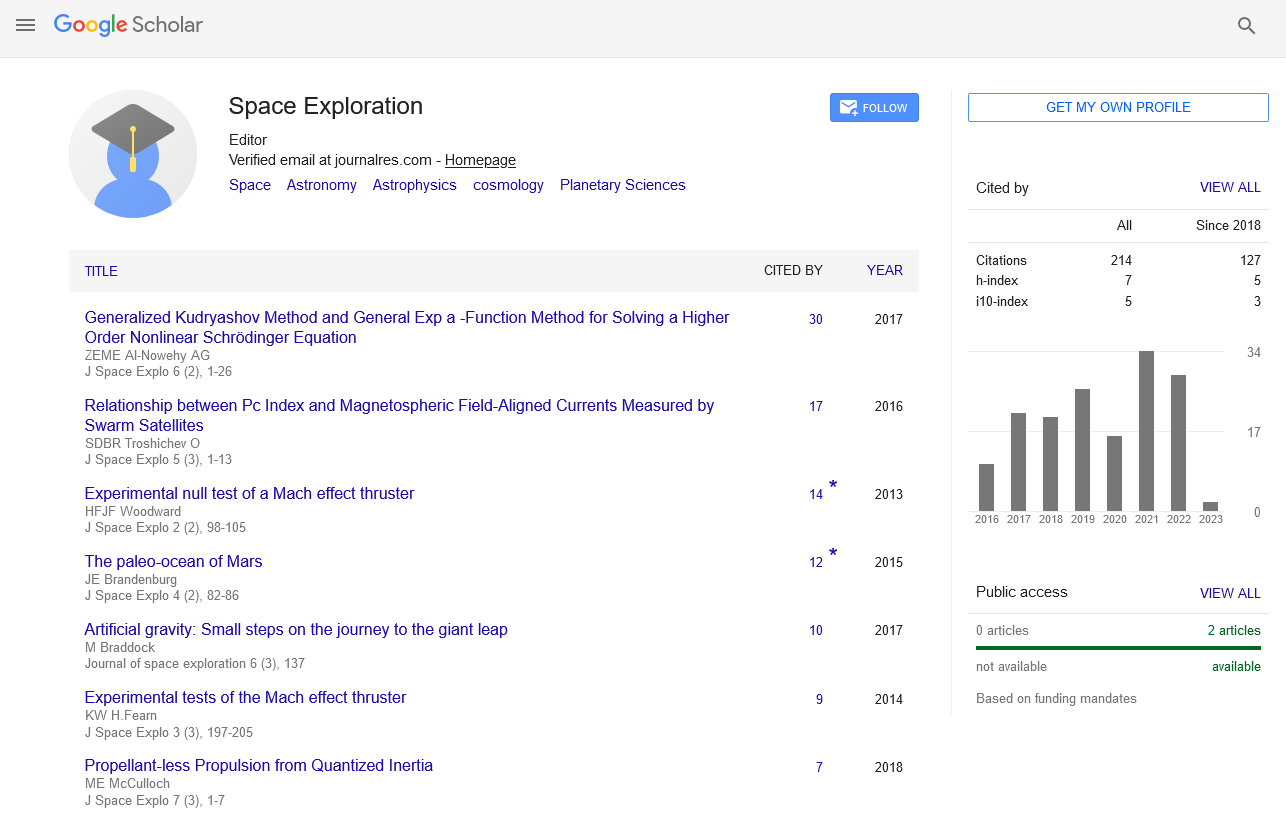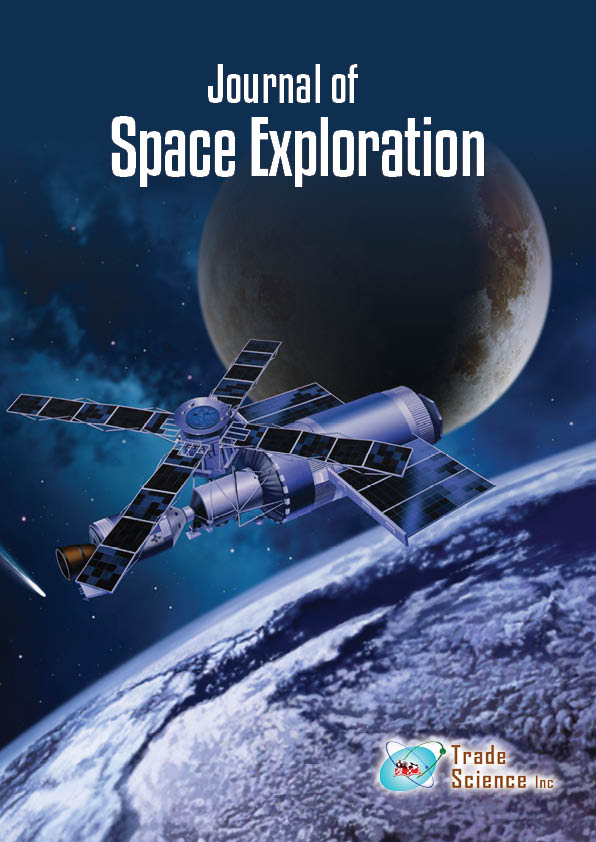About
Journal of Space Exploration covers all aspects of space exploration, with a special emphasis on Earth observation, magnetic field, geomagnetism, aeronomy, mission design and spacecraft and payload design, robotics, galaxy, navigation and control, black hole astrophysics, stellar evolution, astrophysics from space, materials sciences in space, space weather, aerothermodynamics, and astroparticle physics.
Aims and Scope
The main purpose of the journal is to provide a platform for scientists and academicians around the world to discuss, share and promote various topics, issues, and developments in Space Exploration.
The Journal publishes research articles, review articles, short communications, Commentary, case reports, letters, etc., in all areas of space exploration.
Indexed in
1. International Innovative Journal Impact Factor (IIJIF)
2. Scholarsteer
3. Research Bible
4. COSMOS
5. Google Scholar
6. CNKI
7. Open J-Gate
8. Index Copernicus International (ICI)
Internationally renowned scientists describe the results of their research and systematic explorations pertaining to Space science and the published articles are available free of charge.
A scientific committee and anonymous evaluators will review each manuscript electronically after which the accepted articles are published in both HTML and PDF at monthly issue release frequency.
Submit manuscript at: Online Submission System or
send as an e-mail attachment to the Editorial Office: publisher@tsijournals.com
Whatsapp Contact: +44 7723598358
Special issue entitled: New Energy Sources for Space Propulsion "is being edited by *Dr. Takaaki Musha.
*Advanced Science-Technology Research Organization Youkohama, Japan
Fast Editorial Execution and Review Process (FEE-Review Process):
Journal of Space Exploration is participating in the Fast Editorial Execution and Review Process (FEE-Review Process) with an additional prepayment of $99 apart from the regular article processing fee. Fast Editorial Execution and Review Process is a special service for the article that enables it to get a faster response in the pre-review stage from the handling editor as well as a review from the reviewer. An author can get a faster response of pre-review maximum in 3 days since submission, and a review process by the reviewer maximum in 5 days, followed by revision/publication in 2 days. If the article gets notified for revision by the handling editor, then it will take another 5 days for external review by the previous reviewer or alternative reviewer.
Acceptance of manuscripts is driven entirely by handling editorial team considerations and independent peer-review, ensuring the highest standards are maintained no matter the route to regular peer-reviewed publication or a fast editorial review process. The handling editor and the article contributor are responsible for adhering to scientific standards. The article FEE-Review process of $99 will not be refunded even if the article is rejected or withdrawn for publication.
The corresponding author or institution/organization is responsible for making the manuscript FEE-Review Process payment. The additional FEE-Review Process payment covers the fast review processing and quick editorial decisions, and regular article publication covers the preparation in various formats for online publication, securing full-text inclusion in a number of permanent archives like HTML, XML, and PDF, and feeding to different indexing agencies.
*2016 Journal Impact Factor was established by dividing the number of articles published in 2014 and 2015 with the number of times they are cited in 2016 based on Google search and the Scholar Citation Index database. If 'X' is the total number of articles published in 2014 and 2015, and 'Y' is the number of times these articles were cited in indexed journals during 2016 then, impact factor = Y/X
h-index
A wide range of prestigious scholars and scientists cite articles that are published in the Journal of Space Exploration. Every article in the Journal of Space Exploration has an average citation of 6, which means that every article in the Journal of Space Exploration has an h-index of 7
Recently Published Papers
Planck's Hubble constant and 120 Supernovae Type Ia show that the expansion of our local Universe is decelerating
Author(s): Göran Henriksson
The Bayesian regression curve for 120 Supernovae Type Ia, Khetan et al., 2021, corresponds within the margin of errors to the Hubble constant H0=67.4 kms-1 Mpc-1 determined by the Planck Col..
Research, . 2024 Vol: 13( 6)
Exploring Black Holes and Neutron Stars: Culmination of Stellar Evolution and Their Cosmic Influence
Author(s): Jack Wilson
Black holes and neutron stars, the enigmatic remnants of massive stars' evolution, stand as some of the most intriguing objects in the cosmos. These cosmic entities, born from the fiery deat..
Perspective, . 2024 Vol: 13( 6)
Testing Dark Energy Models with Large-Scale Structure Surveys
Author(s): John Martin
Dark energy, an enigmatic force driving the accelerated expansion of the universe, remains one of the most intriguing puzzles in modern cosmology. To understand its nature and properties, sc..
Opinion Review, . 2024 Vol: 13( 6)
The Accelerating Universe: Dark Energy's Influence on Cosmic Expansion
Author(s): Luisa Peter
The universe, in its grandeur, is not only expanding but also accelerating in its expansion. This astonishing phenomenon, observed in the late 20th century, defied conventional understanding..
Opinion Review, . 2024 Vol: 13( 6)
Transformation of the Primordial Universe
Author(s): Dale. R. Koehler
A geometric-model of the Universe is physically manifest as a mathematical solution to the supplemented-Riemann equations (Geometric distortions), and displays • No geometrically-mathem..
Research, . 2024 Vol: 13( 6)

